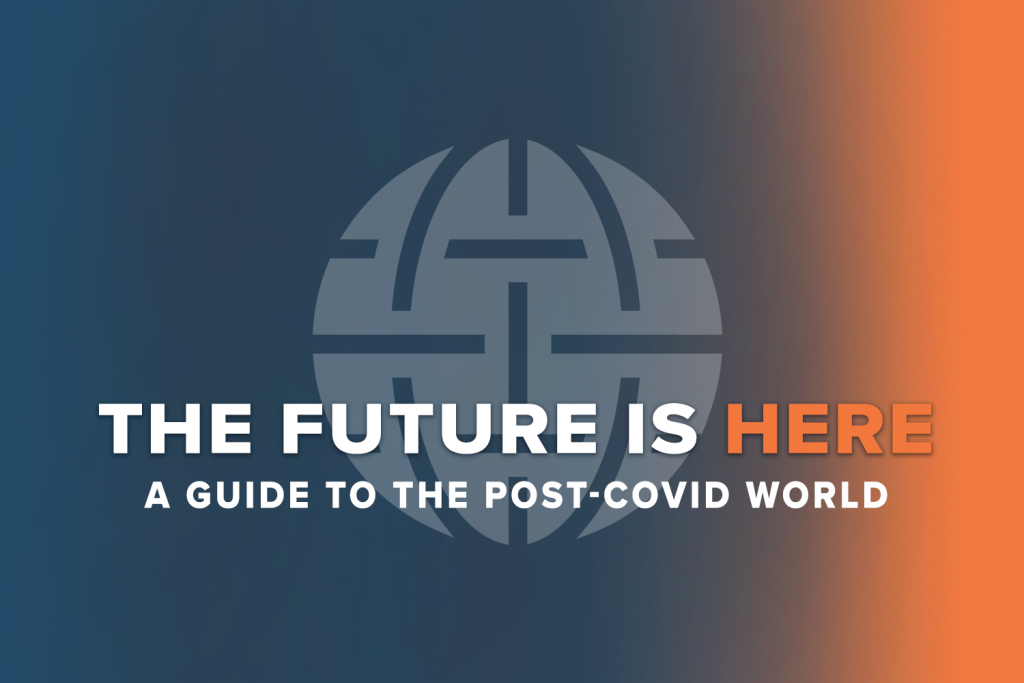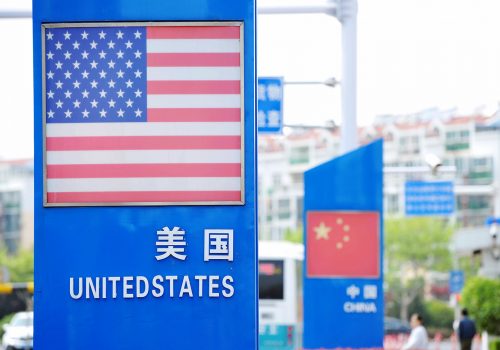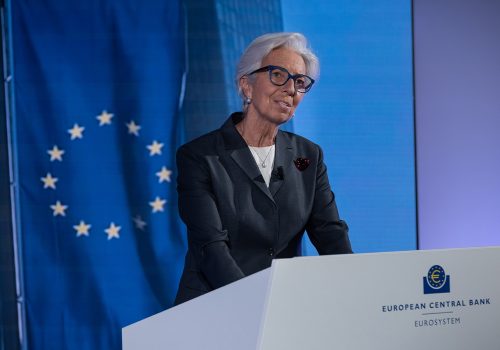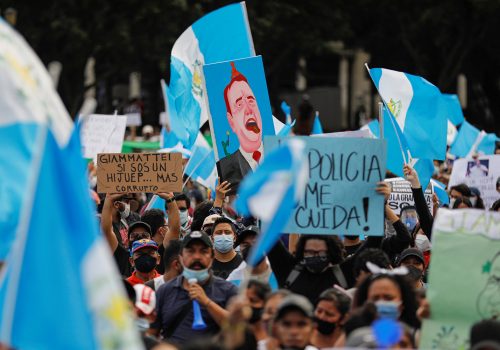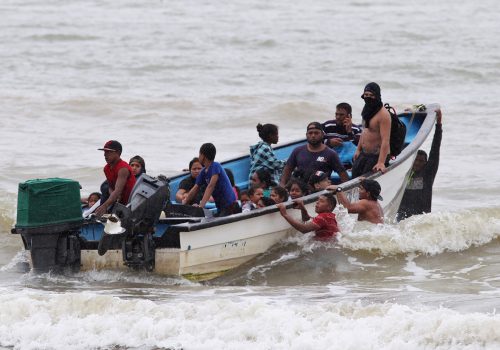The future is here: A guide to the post-COVID world 12/11/2020
Welcome to your guide to where the world is headed during the pandemic era and beyond. Each week, we’ll bring you the latest and most significant expert insights and international news about how coronavirus is reshaping international affairs. To stay updated each week, sign up to the newsletter here.
Let’s take a spin around the globe, in seven minutes or less.
In top stories this week:
- Mass vaccination is now in sight with the first Pfizer-BioNTech shot in the United Kingdom and experts advising the US Food and Drug Administration issuing their approval of Pfizer’s Covid-19 vaccine.
- Paris Agreement signatories are so busy with COVID-19 that they’re turning in their climate plans late; but it’s an opportunity for re-evaluation.
- Anti-vax sentiment is going global, and Pakistan is struggling to curb it.
- But first, we have a special dispatch from Luiza Bandeira of the Atlantic Council’s Digital Forensic Research Lab. Here’s her take on this week’s big story.
The big story
This week’s key theme: The COVID-19 infodemic is threatening to overwhelm the scientific response to the pandemic
COVID-19 has presented us with a paradox: The internet has proved both a public good, facilitating scientific collaboration in all stages of dealing with the virus, and a hazard to humanity, spreading disinformation and conspiracy theories at a faster pace than science could move. This “infodemic” has made it difficult for health authorities to effectively communicate with the public about how to contain outbreaks.
A new report, published by LAUT, INCT-DD, and the DFRLab, maps the infodemic by analyzing a database of fact-checks by more than 70 outlets tracking coronavirus-related disinformation in more than 100 countries. What we see is that false claims circulating in one country usually cross borders to neighboring countries. But that’s not the whole story.
Subscribe to The future is here: A guide to the post-COVID world
Sign up for a weekly roundup of top expert insights and international news about how coronavirus is reshaping international affairs.

The perils of isolation
Two countries stand out as having especially isolated disinformation environments: India and Brazil. Brazil is significantly more isolated than India, and the false claims that crop up within the country last longer, even after being debunked. Fact-checkers, for example, have had to keep debunking claims that particular drugs such as Hydroxychloroquine, Ivermectin, and Azithromycin are effective treatments against coronavirus. Even though claims about these drugs appeared in other countries, they had short lives as sound scientific information batted away the disinformation.
Why has science struggled to stand up to disinformation in Brazil? One of the reasons, according to the report, may be domestic politics. Brazilian President Jair Bolsonaro and his supporters have been amplifying these false claims, supporting coronavirus treatments even after research has shown them to be ineffective.
The bottom line: In Brazil, the response to COVID-19 has become highly politicized, entangling science with not just political but also economic and religious values. Scientific consensus is losing ground to the spread of disinformation, with lessons that must be learned well beyond Brazil We won’t be able to prevent the next infodemic if we don’t understand the patterns of the one we’re living through right now.
The big picture
This week’s key theme visualized: The more isolated the country, the more enduring the disinformation
Misleading claims about COVID-19 are traveling freely across countries and clustering within regions. But disinformation that starts in more isolated information ecosystems, such as those in Brazil and India, tends to last longer and present unique challenges to scientists attempting to correct the falsehoods.
In the diagram below, each color represents a country, while each dot represents a claim; contrails between countries represent a claim being found in multiple countries. Source: Scientific [Self] Isolation
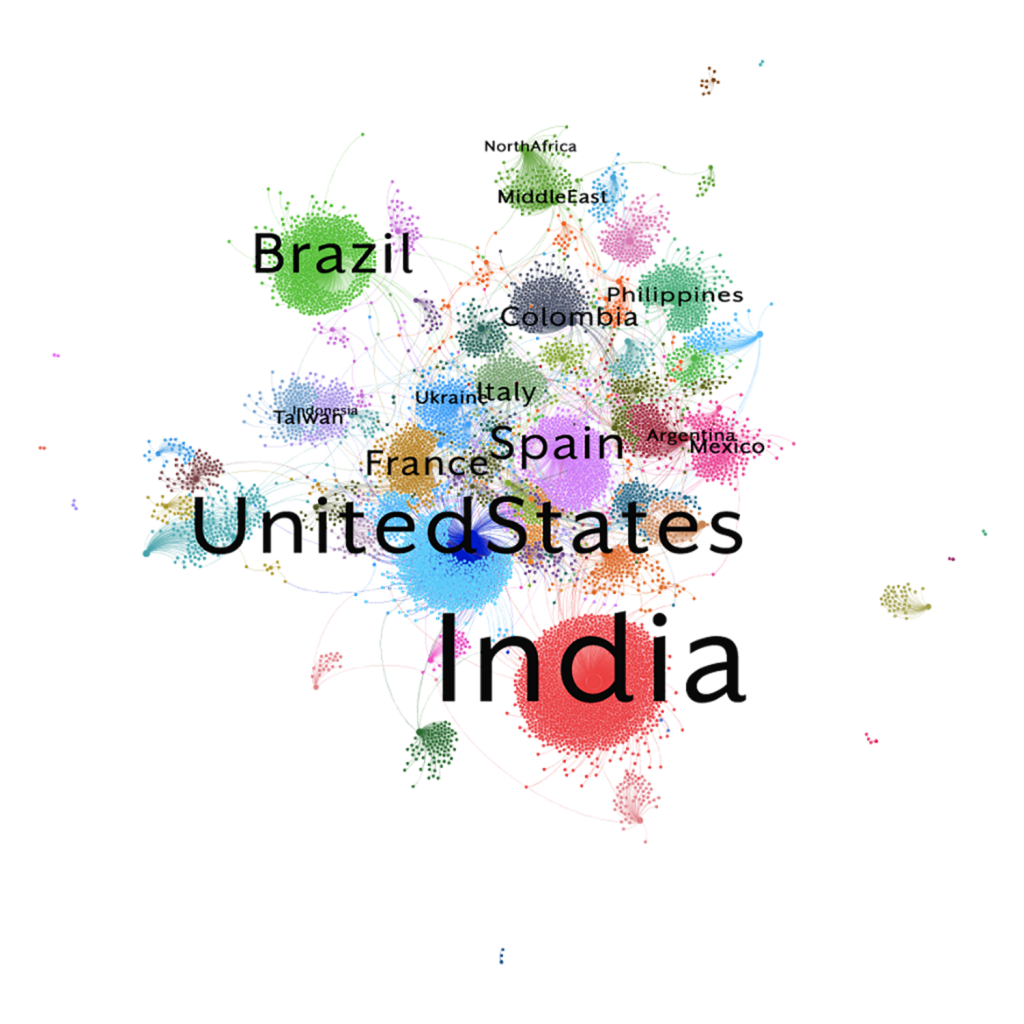
The world in brief
Insights from across the planet, in ten bullets or fewer
- UK mass vaccination begins, one shot at a time. A ninety-year-old woman became the first person in the United Kingdom to get a COVID-19 vaccine after the Pfizer-BioNTech shot got emergency approval last week, CNBC reports. “One down… 54 million to go,” ran a headline on The Daily Mirror’s front page, with a photo of vaccine recipient Margaret Keenan being applauded by a corridor of medical staff.
- But allergy sufferers may not want to hop in line for the Pfizer shot. The warning from UK health regulators came after two health workers had allergic reactions after receiving the shot, though they recovered quickly after treatment, the BBC reports. The health personnel had an anaphylactoid reaction, which usually involves a skin rash, breathlessness, and sometimes a drop in blood pressure, the broadcaster says.
- Europe’s COVID-19 deal is finally done after European Union leaders reached an agreement with holdouts Poland and Hungary on the bloc’s $2.2 trillion budget and pandemic stimulus measures, Bloomberg reports. Brokered by Germany, the deal still includes provisions on upholding democratic standards, but offers compromises on how they are applied. Meanwhile, the European Central Bank went bigger still on its stimulus program, expanding it by more than $600 billion as the region contends with a second wave of infections, CNBC reports.
- Merkel backs tougher lockdown in Germany. Chancellor Angela Merkel is pushing for tougher lockdown measures including shutting shops after Christmas, Reuters reports. A partial lockdown has cut down a period of exponential growth in infections. But infections in Germany, Europe’s biggest economy, are still high, with current restrictions meaning city and town squares stand empty of the nation’s beloved annual Christmas markets. France changed course on a planned easing of restrictions set to begin on December 15, when a strict night-time curfew will begin in an attempt to curb the spread of infections, the Financial Times says.
- QUOTE: “COVID-19 has taught me that fear—gut-wrenching, all-consuming fear, like the fear of dying from a horrific respiratory virus—can be much more powerful than science,” Shira Doron, an infectious disease physician and hospital epidemiologist at Tufts Medical Center in Boston, writes for the news service Stat. “We can’t conquer this fear unless we acknowledge and respect it.”
- COVID-19 is delaying climate-action plans. Many nations will miss a deadline to submit climate-action plans because of the pandemic, the United Nations Development Programme (UNDP) says, according to Reuters. Just eight countries that the UNDP assists have sent in the plans, which are mandated by the 2015 Paris climate pact, and about thirty countries are expected to follow by the end of the year. The UNDP supports 115 of the 197 nations that signed up to the Paris accord. Still, COVID-19 has offered countries the opportunity to increase their ambitions, adds the UNDP, which estimates that 70 percent of countries are likely to turn in more robust plans for climate action.
- People living in developing countries are going to miss out on vaccination as rich nations hoard doses, the BBC cites the People’s Vaccine Alliance, known as Covax, as saying. Almost 70 lower-income countries will only be able to inoculate a tenth of their populations, even though Oxford University and AstraZeneca pledge to supply 64 percent of their shots to developing economies.
- Starting with Kenya, countries begin to cast their votes for some vaccines over others. The East African country may choose the AstraZeneca vaccine because it doesn’t need complex cold storage, whereas the shots of Pfizer and Moderna do, Bloomberg cites a health ministry official as saying. The United States and the European Union have placed firm orders on the Pfizer and Moderna vaccines, which could prompt delays in access for other countries seeking these vaccines, says Rashid Aman, chief administrative secretary in the health department. And in Argentina, President Alberto Fernandez will be the first to take Russia’s Sputnik vaccine, with a plan to inoculate ten million of the country’s vulnerable before March, the newswire reports separately.
- QUOTE: “The Oxford AstraZeneca vaccine is the vaccine right now that is going to be able to immunize the planet more effectively, more rapidly than any other vaccine we have,” CNBC cites Dr. Richard Horton, editor-in-chief of The Lancet medical journal, as saying. “[E]ven if we immunize one country, the threat then is you reintroduce the virus from another country that is not protected.”
- Pakistan needs an antidote for anti-vax sentiment. The drive for a COVID-19 vaccine in Pakistan faces added challenges from widespread anti-vaccination sentiment and conspiracy theories, Reuters reports. It’s a problem worldwide but even more so in Pakistan, where dozens have been killed in attacks on polio-inoculation centers over the years. A Gallup Pakistan poll conducted in November shows that 37 percent of Pakistanis indicated they would not get a vaccine when it becomes available.
- QUOTE: “[T]he tech ecosystem will in its own way begin powering Africa’s growth,” Victor Basta, CEO of the boutique investment bank DAI Magister, writes in a Financial Times guest editorial about how COVID is accelerating a tech revolution in Africa. “The effect will be nothing short of transformational.”
- Flout the rules, fork up the cash. People are committing infractions of COVID-19 restrictions in the most unexpected ways: A man in Italy went for a 280-mile walk after an argument with his wife, while another man under quarantine in Taiwan left his designated room for eight seconds. A third person in Australia drove nineteen miles, lured by the appeal of a chicken curry. All three earned fines, and they’re not alone. Thousands of people worldwide have been jailed or incurred penalties for breaches of pandemic rules, The New York Times reports.
The inside scoop
Insights from the Atlantic Council
